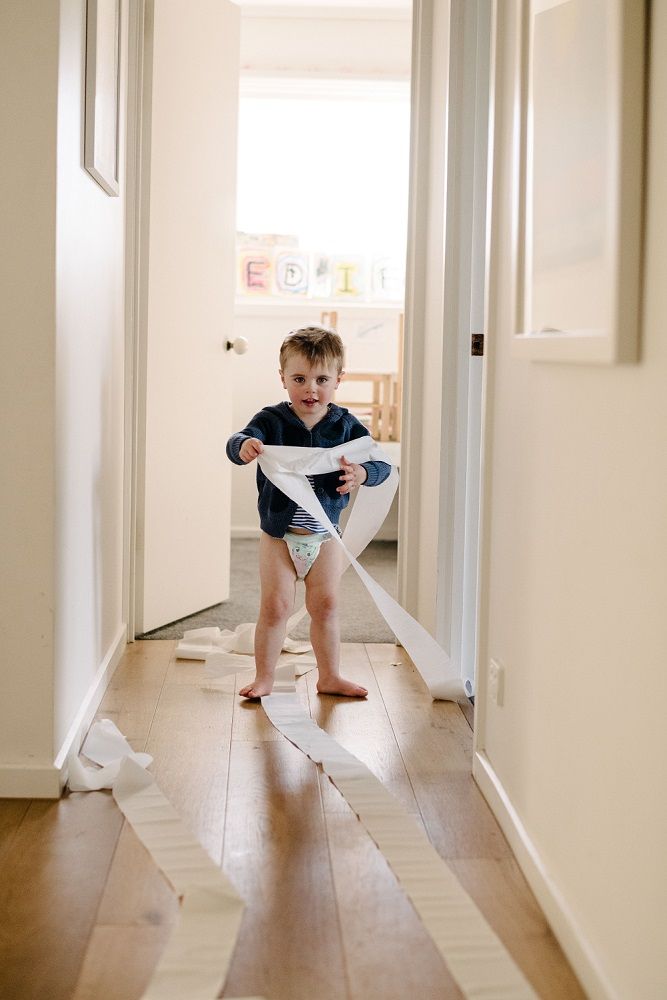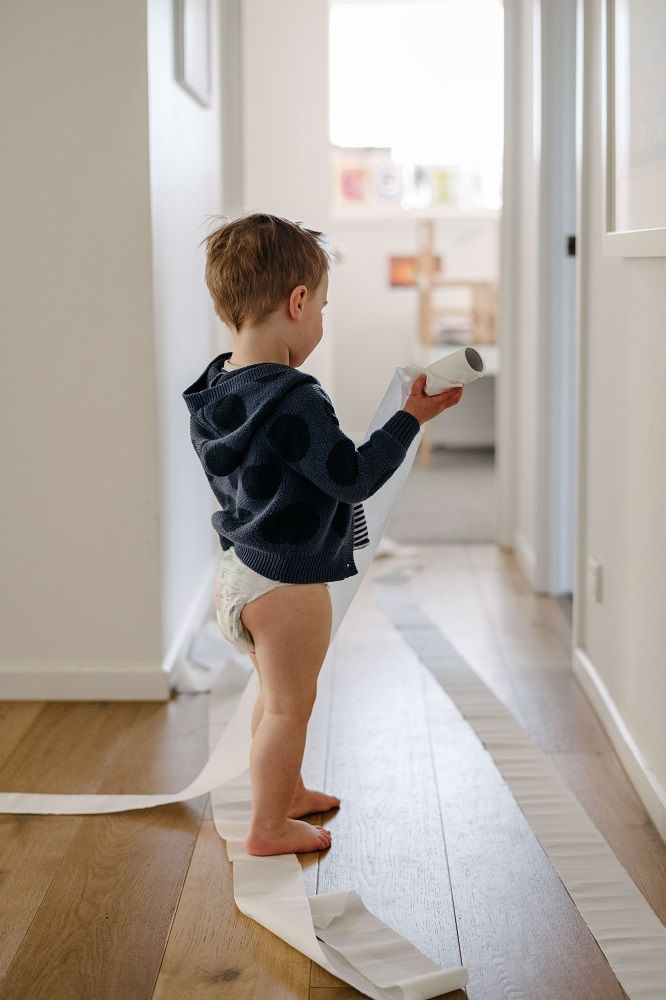Potty Training: Tips For Parents
Key points:
- Children usually show signs that they’re ready to start potty training anywhere from 18 months to three years old.
- It helps to choose a stress-free time of life to start potty training (i.e. not when you’re about to move house or go on vacation).
- There are differences to consider when teaching girls or boys to use the toilet.
- Accidents will happen and can be upsetting for your child. Stay calm and reassure them that it’s no big deal.
Potty training might sound like a nightmare, but it certainly has its perks for parents. Think about the money you’ll save on disposable diapers, or the reduction in laundry if you use cloth diapers! In saying that, as you’ve probably guessed, toilet training can feel like a (literal) shit show at times.
You may be nervous about teaching your child to use the toilet but rest assured it will eventually happen. Everyone gets the hang of it at some point. The key is to be prepared, use a very consistent approach and give your child bucket loads of encouragement.
When is my child ready for potty training?
Most children display signs they’re ready for toilet training from around 18 months to three years old. Common signs include:
- Telling you when they’ve done a poo or pee. Find the language that works for you – poop, doo doo, wee, pee, or anything in between. And they don’t have to use words – gestures, facial expressions or even a little poop dance are all good too.
- Having dry diapers for two hours at once.
- Starting to get irritated with their diaper or trying to pull it off.
- Being able to pull their pants up and down.
- Becoming interested in watching others go to the toilet.
- Being able to follow instructions.
- Walking and being able to sit for several minutes at once.
- Having a regular poop routine.
If your child is showing a few of these signs, it may be time to start potty training. While you might be eager to get your child out of diapers and wiping their own butts, try to follow their cues and not force it. Potty training before they’re ready could be stressful and upsetting for your child. Plus it’ll make the process more difficult for you.
How to start potty training
Start potty training when you feel your child is ready but don’t go into it half-heartedly. Yes, it might be messy and smelly and take a few weeks of solid work, but the goal is to make using a potty the new normal. A very consistent, persistent, and collected approach will make it easier for everyone.
Get prepped
Before you go plonking your kid onto a toilet seat and commanding them to poop (don’t do that), equip yourself with the right tools. You might purchase a potty or get a step to help them reach your regular toilet.
Investing in training pants or pull-ups could help you avoid messes while your child transitions out of diapers. These are like normal underwear but contain extra absorbency to catch accidental slips of the bladder or bowels. But don’t consider yourself done with diapers just yet! You might still need them overnight. Staying dry overnight can take longer than daytime potty training, so it’s a good idea to put a nappy on when it’s time for bed.
In the weeks leading up to potty training, you can start to build an association with the potty by putting dirty nappies into it after you do a change to show your child what it’s for. Start teaching your child words like ‘potty’, ‘poo’, ‘wee’ and ‘I need to go’ so they’re verbally equipped for potty training and listening to your instructions. But be warned: ‘poo’ will become the word of the month. For the next 12 months.

Pick the right time
Choose your timing carefully and avoid starting potty training when life is hectic. If you’re about to head away on holiday, your child is starting childcare or you’re moving house, it’s probably not the right time to start potty training.
While you may not be able to put your entire life on hold, potty training is most effective when your child is relaxed, comfortable and able to have your full attention for a few weeks. It’s a good idea to start on a weekend when you’re at home and don’t need to leave the house. When you do leave the house, bring extra changes of clothes and research toilet locations in advance. You may need to make a sudden sprint to a public bathroom.
When it comes down to it, sit your child on the potty or toilet seat regularly throughout the day and encourage them to do their business. Key times to put them on the potty include:
- In the morning when they get out of bed.
- Before or after snacks and meals.
- When they show possible signs of needing to go like wriggling around, passing wind, going quiet or squatting in a corner (actually, you might be too late by that stage).
- When they change activities. For example, before they start their allocated screen time.
- As part of their bedtime routine.
Leave them on the potty for around 3 to 5 minutes at most. If they haven’t gone to the toilet after that, release them from potty prison.
Offer plenty of encouragement
Start with small wins: “Well done for sitting on the potty!” And don’t underestimate the power of an over-the-top reaction. A successful potty session should be met with smiles, applause and whoops of delight. You’ll leave your child feeling super proud of their poop. You can tone it back once they get the hang of things.
Some parents find that rewards are a great incentive. You could make your child a sticker chart and give them a sticker for each time they go in the potty – but note that you may need to give one to their siblings as well to avoid conflicts. As a bonus, their siblings will start to encourage your child to use the potty successfully too. Hey, more members in the cheer squad can’t hurt.
How parents can lead by example
Leading by example is a great way to teach kids to use the toilet. It may seem weird, but letting them watch you go to the toilet can help them learn. If you share the same equipment as your son or daughter, great – show them how it's done. If not, using a doll or teddy is an easy way to demonstrate how to use the potty.
For your daughter, wipe her butt until she learns how. Teach her to wipe from the front to the back, as this helps girls avoid infections. And afterwards, show her the art of washing her hands.
For your son, demonstrate how to aim, how to flush and how to wash your hands. Many parents find it easier to teach their sons to pee sitting down. Once they're tall enough to reach the toilet bowl standing, it may help to add a ping pong ball or something to ‘target’ to avoid unwanted urine graffiti on your bathroom walls.

Common problems with potty training
What to do about potty training mistakes
So you thought your child had this potty thing down pat, but now they seem to have lost the plot. Accidents are frequent and they don’t seem to know what to do anymore.
Potty training mistakes are normal. They usually happen when something significant is happening which causes stress or throws out the normal routine. This could be moving house, the arrival of a younger sibling, or starting at daycare. It’s good to plan potty training for a chill time of life, but you can’t always help it. If your child is going through a big life transition, support them by offering extra quality time and encouragement. They probably need your reassurance that everything’s okay and will go back to normal.
If a potty regression hits, it can be discouraging and seem like all your work was for naught. Don’t worry – they’ll pick it up again, probably faster this time. Avoid getting upset, embarrassing your child or making them feel silly. The best way to get back on track quickly is to reinforce a good potty routine. Remind them to go in the morning, after meals, before you leave the house and before bed.
What to do when my child has an accident
Accidents are to be expected with potty training. It can be frustrating (and gross) but try your best to stay cool. Remember, your child has been weeing and pooping into a diaper for their entire lives up until now. Accidents are often not intentional and may be upsetting for your child too.
Get them involved in the clean up by bringing towels or putting dirty underwear in a laundry basket. This will show them what’s involved in cleaning up a mess and teach them that it’s much easier to use the potty next time they feel the urge to go.
By continuing to praise and encourage your child when they go to the potty, you’ll reinforce this behavior and help avoid future accidents.
There can sometimes be physical reasons for regular accidents. If your child does this frequently or can’t seem to control their bladder or bowel movements, get them checked out by a doctor.
What to do about misbehaviour while potty training
Potty training can be stressful for children, and stress can be a trigger for tantrums and misbehavior. Stay calm and consistent in your approach, even when they act out.
Some children may misbehave during potty training to get attention from you. If you react by raising your voice and making a big deal, they’ll learn to keep doing this. Instead, respond in a calm, quiet voice. Tell your child what to ‘stop’ doing and what to ‘start’ doing instead (i.e. “stop throwing poop at your sister and sit quietly on the potty”). Enforce discipline tactics like time-out if they don’t listen and continue to misbehave.
Potty training can take time and cause parents lots of stress. Don’t feel discouraged if it doesn’t happen overnight – you’re not expected to be some sort of potty training wizard. While accidents can be frustrating, try to stay calm and keep encouraging your child. Going to the toilet is a key life skill and it’s also a chance for you to have fun with your child. Yes, seriously, you can make it fun! Learn to go with the flow, and you’ll soon be rewarded with far less butt-wiping in your life.
Want to learn more?
Movember launched Family Man to improve the confidence and mental health of dads.
Learn how to master kick-ass parenting strategies by getting started with Family Man. It’s an interactive parenting video series that's expert-backed and funded by Movember.
If research is your thing take a closer look at the evidence behind Family Man.
Or learn more before diving in.